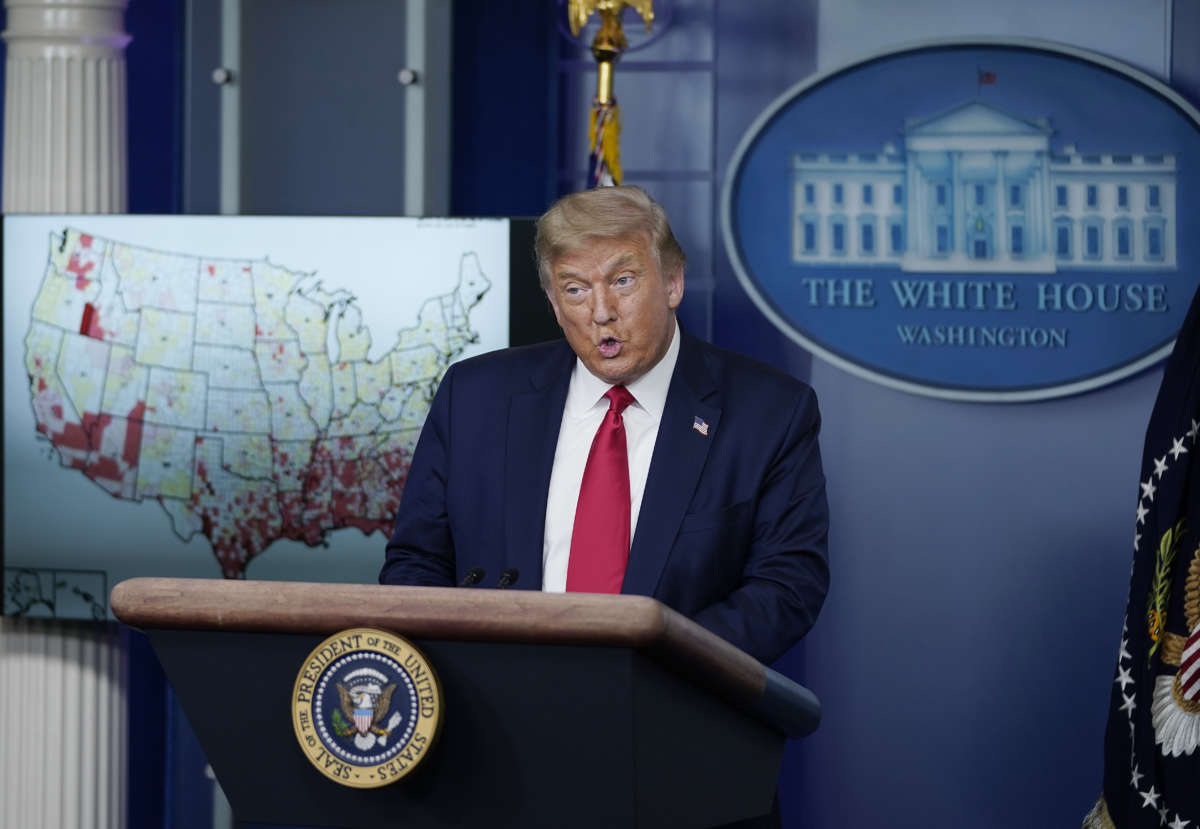Several individuals who are close to President Donald Trump are suggesting that his recent statements on coronavirus, indicating a change in tone on how he views the crisis in the United States, came about more due to politics than a genuine concern for the American people as a whole.
According to reporting from The Washington Post, several aides and advisers to the president, both in and out of the White House, had tried to convince Trump long ago to have a more reality-based approach to COVID-19, with some telling him it’d be wiser not to insist every state “reopen” its economies barely a few weeks into the issuance of stay-at-home orders from their governors.
Trump has flouted many recommendations from health experts, including some of those coming from his own coronavirus task force. These, and other actions he has taken, have led to many criticizing his response to the disease, including some suggesting that it could prolong how long the crisis lasts.
But last week, it appeared that Trump had (almost) done a complete 180 on how he viewed aspects of the pandemic, including advising all Americans to wear masks when they’re out in public — a marked change from views he previously held about masks and facial coverings, including believing that they were worn by some to spite him. He also canceled parts of the Republican National Convention that was set to take place in Jacksonville, Florida, in light of coronavirus’s spread in that state.
To be sure, Trump has not made significant changes to his coronavirus strategy yet — for instance, he said he won’t issue a mandate to Americans to wear masks anytime soon. Still, his statements are surprising, given his strong reluctance to take the disease seriously up until now.
According to The Post, his change of heart came about when advisers showed him charts and other visual media detailing how the disease was spiking in traditionally Republican states and strongholds, telling the president that “our people” were becoming victims of COVID-19. They also told him voters in swing states like Michigan, Minnesota and Wisconsin were in jeopardy from the disease’s spread.
Revelations like these led to Trump’s staying more “on script” when it came to speaking about the crisis, and to his promising more action on handling the disease.
“This could have been stopped. It could have been stopped quickly and easily. But for some reason, it wasn’t, and we’ll figure out what that reason was,” Trump said on Thursday.
In spite of his assurances, data from a number of polls over the past week have demonstrated that the American people, by more than a two-to-one margin, are more likely to disapprove of his response to COVID-19 than approve of it so far.
Trump’s initial failure to take the disease seriously came about for a number of reasons, individuals speaking anonymously to The Post explained. For starters, his refusal to ever admit he has done anything wrong made it hard for him to see the crisis as going badly. They also cited a “feedback loop” of positive grades he’s received from some advisers and conservative media like Fox News, as well as his own “magical” belief that the pandemic would end on its own, for the way he previously behaved.
Whether Trump decides to take coronavirus seriously from this point on or not is anybody’s guess, as it’s equally (if not, more) possible he will change his tone again in the coming days.
The president had the same dismissive attitude about the disease in February and early March of this year. When it became clear that the disease posed a real threat to the United States, he finally relented and issued out social distancing recommendations for the American people to follow.
Days later, however, after states began imposing stay-at-home orders based, in part, on those recommendations, Trump launched a campaign of demanding that those orders be relaxed and rescinded, perhaps in part due to his seeing the economy respond negatively to them and believing his reelection chances would sour if Americans blamed him for the poor economic outcomes.
Given his record of being dismissive, then accepting, then dismissive again about the threat COVID-19 poses, it’s quite possible he could shift his feelings again in the next few days, back toward viewing the disease with a contemptuous demeanor all over again.
Thank you for reading Truthout. Before you leave, we must appeal for your support.
Truthout is unlike most news publications; we’re nonprofit, independent, and free of corporate funding. Because of this, we can publish the boldly honest journalism you see from us – stories about and by grassroots activists, reports from the frontlines of social movements, and unapologetic critiques of the systemic forces that shape all of our lives.
Monied interests prevent other publications from confronting the worst injustices in our world. But Truthout remains a haven for transformative journalism in pursuit of justice.
We simply cannot do this without support from our readers. At this time, we’re appealing to add 43 monthly donors in the next 2 days. If you can, please make a tax-deductible one-time or monthly gift today.
